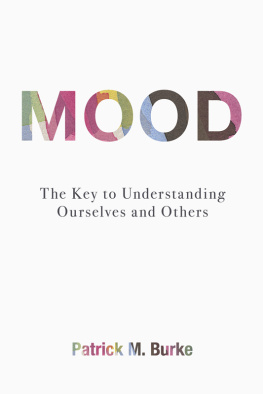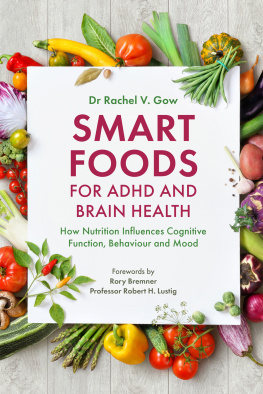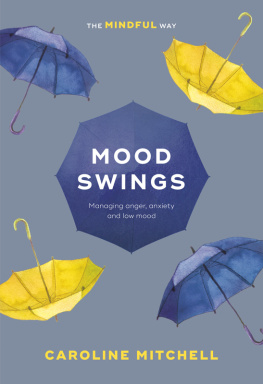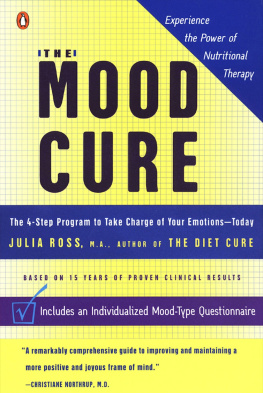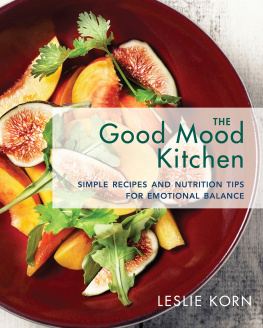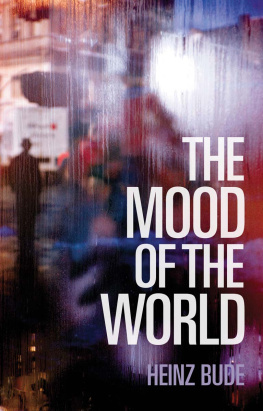Published 2014 by Prometheus Books
Mood: The Key to Understanding Ourselves and Others. Copyright 2013 by Patrick M. Burke. All rights reserved. No part of this publication may be reproduced, stored in a retrieval system, or transmitted in any form or by any means, digital, electronic, mechanical, photocopying, recording, or otherwise, or conveyed via the Internet or a website without prior written permission of the publisher, except in the case of brief quotations embodied in critical articles and reviews.
Trademarks: In an effort to acknowledge trademarked names of products mentioned in this work, we have placed or after the product name in the first instance of its use in each chapter. Subsequent mentions of the name within a given chapter appear without the symbol.
Cover design by Nicole Sommer-Lecht
Inquiries should be addressed to
Prometheus Books
59 John Glenn Drive
Amherst, New York 142282119
VOICE: 7166910133
FAX: 7166910137
WWW.PROMETHEUSBOOKS.COM
18 17 16 15 14 5 4 3 2 1
The Library of Congress has cataloged the printed edition as follows:
Burke, Patrick M., 1946
Mood : the key to understanding ourselves and others / by Patrick M. Burke.
pages cm
Includes bibliographical references and index.
ISBN 978-1-61614-807-2 (pbk.)
ISBN 978-1-61614-834-8 (ebook)
1. Affective disorders. 2. Affective disordersTreatment. 3. EmotionsPsychological aspects. 4. Resilience (Personality trait) I. Title.
RC537.B8684 2013
616.8527dc23
2013024868
Printed in the United States of America
This book is dedicated to my late wife, Velma Dobson, PhD,
the single greatest and enduring influence in my life,
for showing us how to live a life of integrity
and in the end how to die with grace and dignity;
and to our children, Meg and Andrew,
and to the newest additions to our family, Tiffany Gromlich and little Oliver.
I am forever grateful for their willingness to help; their expertise;
and their unquestioning love, support, and encouragement.


This book is the fulfillment of a promise made to my wife, Velma Dobson, before she passed away from complications of Amyotrophic Lateral Sclerosis (ALS, or Lou Gehrigs disease) in April 2010. I had started out to write a book about psychiatric disorders in youth for the nonexpert, but a radically different book emerged as we grappled with her disease, and I began to better understand the role mood plays in our lives and how the forces that act on mood could serve as a unifying theme for the book and help us surmount the challenges of ALS.
The original impetus for a book grew out of the frustration I experienced as a child psychiatrist as changes in healthcare delivery increasingly limited my time with children and families to brief assessments and medication management with little room for any but the most formulaic explanations and answers to questions. There was in addition an underlying dissatisfaction with the standard approach of discrete disorders with overlapping risk factors and treatments that put the disorder and not the person at the center.
The solution came when, stimulated by a lectures series by Richard Solomon, I realized that Martin Heideggers ideas on mood could provide the needed theme. The approach and ideas for this book were initially developed and tried out at La Frontera, Inc., in Tucson, Arizona, and I am especially thankful to the staff and patients of the center. When my wife became homebound, I stayed home to help. We worked in parallelshe continuing to work with her research colleagues in an incredible display of courage and perseverance, while I researched background material and worked on a book proposal. The book was written after she died, informed by a now-deeper understanding of the role of mood and the connections between mood, relationships, commitment, and action.
Many people have helped me along the way to writing this book. I most gratefully acknowledge two individuals who played seminal roles in my career. The late Sean Lavelle, MD, a professor in my medical school in Galway, Ireland, saw something in a bored medical student who told him he really wanted to study developmental psychology. He started me on a path that led to Lewis P. Lipsitt, PhD, who graciously took me on and persevered with me as his graduate student at Brown University. This was one of the great adventures of my life, an exciting time when I was exposed to investigators and graduate students, among them my future wife, full of ideas and doing cutting-edge research.
My psychiatric education followed at the University of Washington under the tutelage especially of David Raskin, MD, and David Rowlette, MD, and where Charles Nagel, MD, advised me that the key to difficult psychiatric problems was to find the affect, an adage that has been with me since. And where Eric Trupin, PhD, and Robert Reichler, MD, taught me the value and necessity of an empirical and multidisciplinary approach to child psychiatry.
Throughout the process of writing this book many friends and colleagues listened patiently to my musings, helping me think out ideas, providing insights, confirming the value of my approach, and in many cases providing helpful comments on various drafts of proposals and chapters. I particularly want to thank Anne Libecap; Linda Karl, MD; Helen Herziger; Clara Billotte; Kelly Vogiatis; Caroline Duffield; and Richard Hinton, PhD. I am also grateful to the child psychiatry fellows (especially Adolfo Martinez, MD, and Anna Shier, DO), residents, and students in the Child and Adolescent Psychiatry program at the University of Arizona for their patience with my lectures and supervision, insightful comments, and encouragement.
Victoria Blake helped with my initial efforts at writing a proposal and gave me spot-on advice on getting an agent. I am forever indebted to my agent Nancy Rosenfeld, AAA Books Unlimited, for her unfailing support, encouragement, persistence, and editorial advice. My editors Steven L. Mitchell and Julia DeGraf and the staff at Prometheus Books have been unfailingly supportive, professional, and expert in shaping the book. Pat Broyles in her inimitable calm and proficient way helped in formatting and typing notes, as well as being an important link to my wife for whom she was an administrative assistant for many years. Finally, thanks to Dave Cantrell for creating the figures that appear in chapters .

We are told that nothing in the world is certain except death and taxes. But we can add a third certainty. We are always in a mood. What is more, we are constantly faced with references to mood: popular tunes of happiness or sadness; pundits opining that the economic mood of the country will determine the outcome of an election or that the mood in the locker room will determine which team wins the game; advertisements telling us a product will change our mood and our lives. Mood is everywhere and somehow is linked to what we find important and meaningful. Emerson described life as a train of moods strung like beads, which, as we pass through them, prescribe what we see.
But our moods change, and we seem to have little control over when and how the change occurs. It seems we can neither command nor will our mood to change. Rather, our mood changes, and it is only after the change that we realize we are in a different mood. Most of the time, we pay little attention to changes in our mood or how the changes occur. But the change can be disturbing. We find we are sad, anxious, uneasy, or feel threatened. If the new mood interferes with our ability to function, the change may amount to a mood disorder. For many, these disorders can be destructive to their lives and can warrant professional attention. How does this happen?

